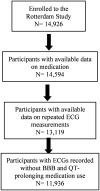QTc-interval prolongation and increased risk of sudden cardiac death associated with hydroxychloroquine
- PMID: 33623975
- PMCID: PMC7717273
- DOI: 10.1093/eurjpc/zwaa118
QTc-interval prolongation and increased risk of sudden cardiac death associated with hydroxychloroquine
Abstract
Aims:: Hydroxychloroquine and chloroquine ([hydroxy]chloroquine) are drugs used to treat malaria and rheumatological disorders and were recently suggested as beneficial for prevention and treatment of patients with coronavirus disease 2019 (COVID-19) due to SARS-CoV-2 infection. However, longitudinal studies to assess the electrocardiographic and cardiotoxic effects of these drugs are limited. In this study, we aimed to investigate the effect of these drugs on QTc-interval and incidence of sudden cardiac death (SCD).
Methods: We designed a longitudinal follow-up study of individuals within the prospective population-based Rotterdam Study. Eligible individuals had available data on medication and repeated ECG measurements. The study period was between 1 January 1991 and 1 January 2014. We studied on current and past use of [hydroxy]chloroquine as a time-varying exposure; high versus low daily dose of [hydroxy]chloroquine. QTc-interval duration, and the occurrence of SCD were the main outcomes. SCD was defined as an unexpected and sudden death due to cardiac arrhythmia within one hour of the onset of acute symptoms, and in patients without cardiac symptoms within 24 hours before death.
Results: Among the study population of 14 594 individuals (58.8% women) with an average age of 65 years, 346 patients used [hydroxy]chloroquine at any time during follow-up. The total number of SCD cases was 609. In a multiple linear mixed model analysis, the current use of [hydroxy]chloroquine was associated with a significantly increased duration of the QTc-interval of 8.1 ms (95% CI: 3.6; 12.6) compared with non-users. The association was stronger among current-high daily dosage [15.3 (95%CI: 7.0; 23.6)] compared with current-low daily dosage [5.5 (95%CI: 0.4; 10.7)] users. In a Cox proportional hazard regression analysis, the risk of SCD was significantly higher in participants who were current users of [hydroxy]chloroquine than in non-users [adjusted hazard ratio; 3.7 (95%CI: 1.1; 12.6)].
Conclusions: In this longitudinal study, persons who received [hydroxy]chloroquine had an increased QTc-interval duration and the association was dose-dependent. [Hydroxy]chloroquine was associated with a significantly increased risk of SCD. As long as their activity against COVID-19 is controversial, cardiotoxicity is a strong argument against using these drugs to treat COVID-19 infections.
Keywords: Chloroquine; Hydroxychloroquine; QT/QTc-interval; Sudden cardiac death.
Published on behalf of the European Society of Cardiology. All rights reserved. © The Author(s) 2020. For permissions, please email: journals.permissions@oup.com.
Figures




Comment in
-
The strange case of hydroxychloroquine and COVID-19.Eur J Prev Cardiol. 2022 Feb 3;28(17):1873-1874. doi: 10.1093/eurjpc/zwaa165. Eur J Prev Cardiol. 2022. PMID: 33580785 Free PMC article. No abstract available.
References
-
- Lee SJ, Silverman E, Bargman JM. The role of antimalarial agents in the treatment of SLE and lupus nephritis. Nat Rev Nephrol 2011;7:718–729. - PubMed
MeSH terms
Substances
Grants and funding
LinkOut - more resources
Full Text Sources
Research Materials
Miscellaneous

